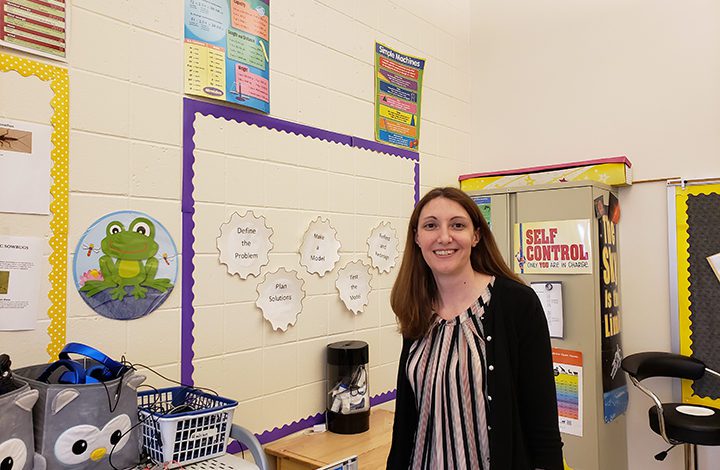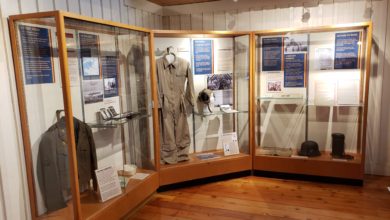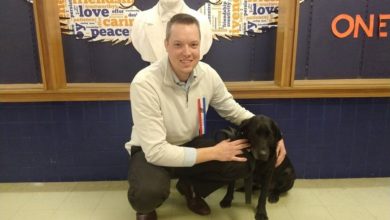Mahomet’s Jennifer Smith a Golden Apple Award Finalist

BY DANI TIETZ
dani@mahometnews.com
Adults hope that the education children receive creates a ripple effect.
Knowledge is poured into them, then at some point, whether in the present moment or decades down the road, they realize its value and do something with it.
But a few educators get to see the ripple effect created within a child while they are still young.
This is happening in the Monticello School District.
Monticello Middle School’s eighth-grade science teacher Jennifer Smith — a Mahomet resident — has worked tirelessly to provide a learning environment that sparks students’ curiosity and encourages them to begin looking at real-life applications.
Although her sights were not set on recognition, but rather on education, Smith is one of the 30 finalists for the 2020 Golden Apple Award.
Monticello Middle School principal Jeanne Handley sent in Smith’s nomination. The field started out with a record-setting 732 nominees from 64 counties in Illinois
“She’s a superstar,” Handley said.
“Her love of science just comes through to our students, and, you know, she’s given our students opportunities they probably would have never gotten.”
Smith’s classroom is set up like a typical junior high science classroom: desks and chairs, lab tables and lab tools. But from a flipped classroom where students watch teacher-created videos and complete interactive lessons from home to a hands-on instructional time where students engage with peers to create real-life solutions or pass on what they know to younger students, Smith is igniting young minds.
Smith started out in the Paris Crestwood School District, teaching fifth grade.
“I taught everything,” she said.
When she came to Monticello, she was a language arts and science teacher.
“I love language arts. I love the connection that I can get with with students that way,” she said.
She loves it so much that in her spare time, she teaches language arts and social studies through an online class.
“But I think what’s cool about science is making real life connections,” she continued. “It’s so much easier to get students to love to do hands-on things. And they’re so passionate about those things that connect to their lives.”
Right now, that connection means that cardboard boxes students built to simulate incubators line the walls of the Monticello science lab.
“We created prototypes of infant incubators that could be powered by chemical reactions, so that they could be used when power wasn’t working somewhere,” Smith said.
“We talked about infants and we talked about the things that they need, so we talked about the biological aspects of it.
“And then we learned about chemistry and ratios and chemicals; and then engineering to put it all together. Then I was able to borrow one of the family consumer science babies from the high school to test the incubators.”
Smith also talked to students about the challenges college students are having in trying to solve this problem and how students get patents.
“I want them to see that science isn’t just here. It’s everywhere. Always,” she said.
Instead of giving her students all the answers, Smith enjoys helping them process their ideas so that they draw their own answers and conclusions.
“I think before the ‘aha’ moment, you really have to challenge them, and sometimes they don’t like that,” she said. “And so, I use a lot of wait time.”
There are long moments where the silence becomes uncomfortable, just waiting for an answer, but when the time is right, Smith will throw out any question that might prompt an answer.
And then, she encourages the students.
“‘You’re almost there. You’re almost there; just keep going,'” she said. “So when they finally get it, it’s pretty awesome.
“For me, but mostly for them because they work really hard. They have to be challenged, but to work really hard to get that. Sometimes they expect things to just be easy. And sometimes they give up. And so really getting them to push, so they can have that true sense of accomplishment; is important so then they really can feel like they’ve done something.”
It was a gift she received as a student, too.
“My first grade teacher was really important to me. She taught me that it’s okay to use an eraser,” Smith said.
“To use the eraser doesn’t mean there’s anything wrong. We can always improve something, it doesn’t mean that we did a horrible job, it just means you try a little harder, working a little harder.”
Students in Smith’s classroom learn that the outcome is important, but the process leading up to the final answer should also be valued.
“Acknowledging the work that’s put in, no matter how many times the eraser had to be used is really important,” she said. “I let my students correct their work, because it’s learning. It’s not an end product, I want to see their learning, not the end.”
Bridging technology-based learning with hands-on learning allows the students to have the tools they need to become problem-solvers and communicators.
The incubator project required students to review flip notes, and allowed them to use thermometers and rulers while also giving them time to build and manipulate their product while they collaborated with their team members.
“I work a lot with social emotional learning (SEL) and making sure they can work collaboratively in a group and what does that mean and what does that look like and how do I work on a project with someone who has a different idea than I do? How do we all get to share ideas?” Smith said.
Smith’s students not only share ideas among their peers, but once they have mastered a concept or idea, she wants them to introduce it to someone who may not yet know.
“Science buddies” allows the eighth-grade students to travel to Monticello Elementary to meet with first-graders. Smith wrote an Ag in the Classroom grant to get books that talk about gardening or other science topics.
“They’re responsible for planning a science lesson,” she said.
Eighth-grade students will read a story to their buddy, talk about facts, come up with a craft and an appropriate snack.
“One of the cool things about that is the relationships that they are able to build,” Smith said. “The first-graders get so excited to see their science buddies come in. The eighth-graders won’t tell you, but it makes a big difference to them to be looked up to and respected.”
Smith is working on building a science community in Monticello.
With an Illinois Biodiversity Grant, she is able to take eighth- and sixth-grade students on a field trip to the Shedd Aquarium each year.
The eighth-graders then work with the sixth-grade students on water-quality testing.
“Eighth-graders teach the sixth-graders how to do the water quality tests and use the equipment,” Smith said. “We’re able to monitor pH levels and then when the sixth-graders get to eighth grade they’re like, ‘Oh yeah, I remember when we did that.’
“I think that the coolest thing is when the kids get to me, they’ll remember something that they’ve done in my classroom or with my students from previous years when they were little; ‘I thought it was cool then,’ and then being able to kind of turn around and do that for other kids.”
Eighth-grade students also work with third-graders on DNA.
A Nationally Board Certified Teacher, Smith has helped to implement the NGSS (Next Generation Science Standards) program at Monticello.
Alongside being one of the 12 finalists for the Illinois State Board of Education Teacher of the Year in 2015, Smith was also a finalist for Samsung’s Solve for Tomorrow contest.
Smith piloted standing desks in her classroom, then studied how physical movement in a classroom could impact student’s education and physical well-being. The project earned Monticello about $25,000 Chromebooks, Chromebook carts and tablets to use in the classroom.
“Just the infusion of technology into teaching; it has been phenomenal,” Handley said.
“Obviously our society is going that way to more of a digital platform, and she’s been on the forefront.”
When superintendent Vic Zimmerman inquired about Maker Spaces, Smith stepped up to the plate with start-up fees, then took it upon herself to bring the idea to life for students.
“I don’t know when she sleeps,” Handley said.
“She’s a good mother, also. Her kids mean everything to her, but yet, she finds time to do the extra stuff that makes her phenomenal in the classroom as well.”
Smith understands that the impact she can make on students extends outside of the classroom, too. She serves on state committees and has helped Monticello launch a “Parent University” that seeks to bring in experts for parents to learn about the challenges their children may face in today’s world.
“It’s just the love of teaching,” Handley said. “The commitment to make sure that our kids have as much as they possibly can for when they take that next step into the high school and beyond.”
The ripple effect that Smith has on students isn’t only seen within the educational web she weaves between school years, but Handley said students come back to the middle school after graduating from college to talk about the things they learned in her classroom.
“She’s got a gift,” Handley said.
Smith’s main focus is bringing the world to life for her students. She shares her experiences with her colleagues, never pressuring them to take on what she does, but instead offering insight to what has been successful.
Handley said Smith’s efforts are one of the many reasons Monticello Middle School was named a “Schools to Watch” in 2016 and 2019.
Sponsored by the National Forum to Accelerate Middle-Grades Reform “Schools to Watch” recognizes schools that are “academically excellent, developmentally responsive and socially equitable.”
Handley, who will retire at the end of the school year, said Smith has been a blessing to the building.
“It’s the things like this that I’ll look back on,” she said.
“Had I not had someone like Jennifer to push in to offer opportunities into research and into good things, we probably wouldn’t be where we are as a middle school.”
This year’s Golden Apple Celebration of Excellence in Teaching & Leadership will be held in St. Charles, Ill. on Feb. 22. All finalists will be honored.




